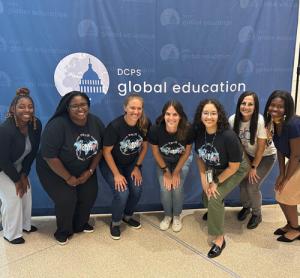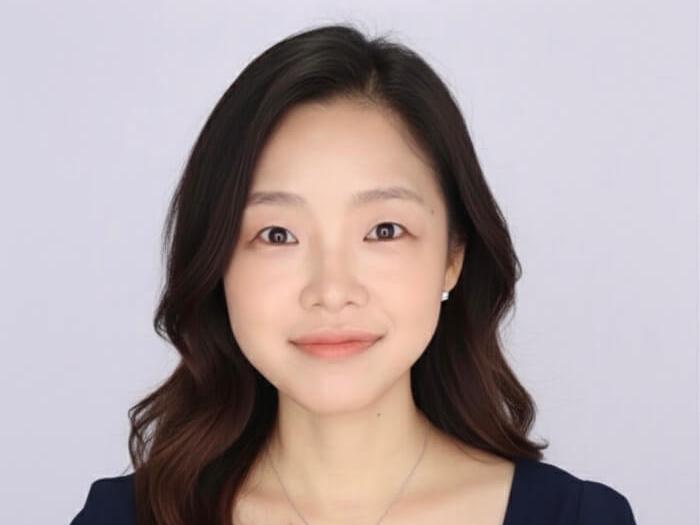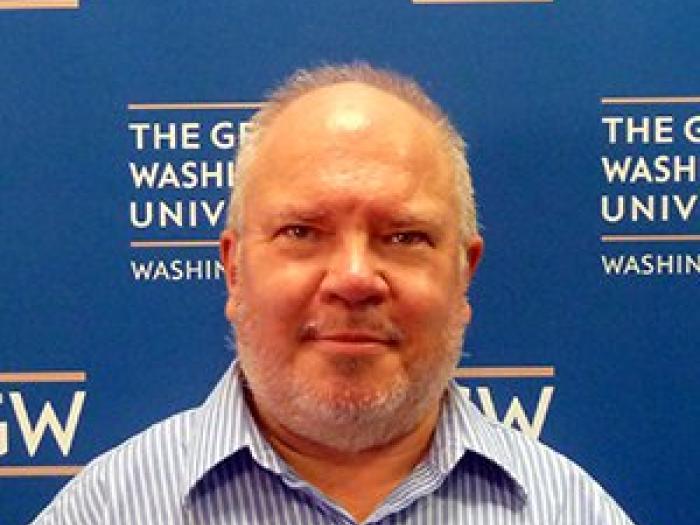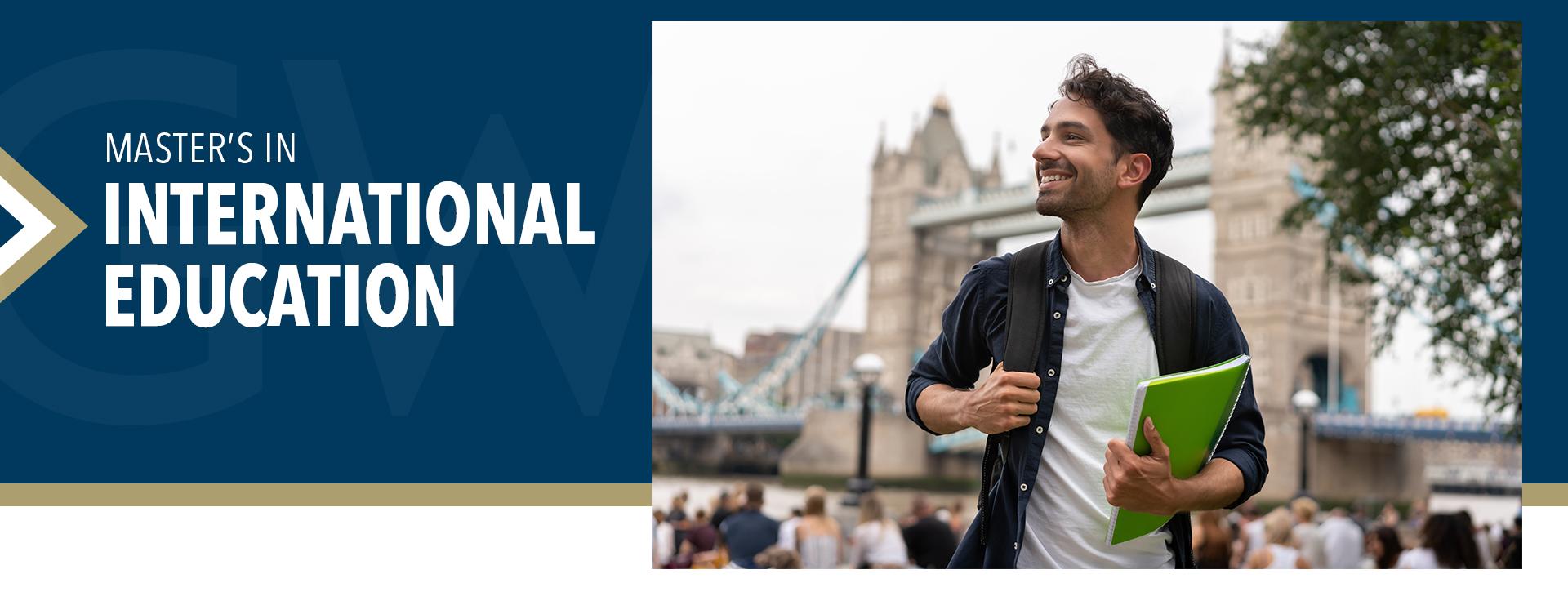Master's in International Education
Elevate Your Impact on a Global Level
GW’s Master’s in International Education Program (IEP) prepares scholar-practitioners to lead transformative change in global education and expand access to quality learning worldwide.
Through a dynamic blend of interdisciplinary coursework and international fieldwork, you’ll examine education systems through cross-cultural lenses; develop and apply innovative, research-informed solutions; and build the expertise and global perspective needed to shape equitable, inclusive, and sustainable learning environments across diverse contexts.
Explore the history, culture, and evolution of education systems while addressing today’s most urgent challenges—expanding access in underserved communities, navigating ecological disruption, supporting education in crisis- and conflict-affected regions, and engaging in multilateral governance.
Whether your career path leads to policy, leadership, global development, training, or research, you’ll graduate equipped to strengthen education systems and drive meaningful social change locally or around the world.
Global Experience, Real-World Impact
Earn academic credit while gaining hands-on experience through internships both in the U.S. and abroad, or expand your perspective with short-term study abroad and faculty-led study tour programs.
Hands-On Research
The program culminates in a capstone project, an applied research experience where students engage with complex, real-time issues in international education.
Students have published their research in peer reviewed journals and books, presented at academic conferences, contributed to client-based projects, and worked with faculty on funded research projects.
A Legacy of Excellence
With more than 30 years of leadership in International Education, our program has built a rich legacy of excellence, a strong global presence, and a robust alumni network in the DC area, across the US and internationally. As a pioneer in the field, GW continues to produce scholar-practitioners who drive meaningful change worldwide.
Convenient Schedule
Designed with the busy professional in mind, courses are scheduled once a week in late afternoons and evenings (Monday-Thursday) and occasionally on weekends, allowing you to balance your career, personal life, and education seamlessly.
The IEP is organized into three dynamic area of focus, each of which can be tailored to meet your specific career interests. Speak to your faculty advisor or email iep![]() gwu [dot] edu (iep[at]gwu[dot]edu) to learn more.
gwu [dot] edu (iep[at]gwu[dot]edu) to learn more.
- International Higher Education
Explore how higher education institutions worldwide navigate globalization's challenges and opportunities. This stream addresses critical themes such as:
- internationalization
- student mobility
- access and equity particularly for underserved populations, such as at-risk migrants and students of refugee background
- rankings
- competition
You'll analyze how these forces shape higher education and work to promote access and excellence in a global context.
- Global Education
Dive into the evolving dynamics of K-12 education in a globalized world. This stream addresses critical themes such as:
- internationalization
- K-12 study abroad
- measures of global competence
- curriculum and teacher training
- world language education
- education for sustainability
You'll be equipped to design innovation solutions that prepare globally competent students and educators.
- International Educational Development
Focus on leveraging education to improve opportunities for individuals and communities in low- and middle-income countries and regions impacted by conflict and crisis. From development education to education in emergencies, this stream empowers you to create sustainable, equitable education systems that transform lives.
The GW Advantage
Our location in D.C.—the epicenter of policy, practice, and research in the United States—is your advantage. With embassies, government agencies, and 100+ international organizations within walking distance of campus, you'll have unparalleled access to internships and career opportunities that shape the future of international education.
At GSEHD, you’ll learn from faculty who are leading voices in global policy, education in conflict zones, student mobility, equity and inclusion, migration studies, and more. Our diverse community brings together students from across the world, each contributing unique expertise and experiences to enrich your learning.
Degree Awarded:
Master of Arts in Education and Human Development in the Field of International Education
Department:
Educational Leadership
Course Delivery:
Foggy Bottom Campus
Program Entry:
Spring, Summer, Fall
- Our Mission
The mission of our program is to:
- Optimize the constructive leadership capacity of individuals to advance education reform, and social and environmental justice on a global scale.
- Enhance individual, organizational, and community resilience, effectiveness, and equity at global, national, and local levels.
- Train scholar-practitioners with the capacity to lead and address critical education issues in international organizations, government, business, and non-profit organizations.
- Curriculum Requirements
Required: 30 credits, including 12 credits in required courses, 6 credits in selected courses, 9 credits in cross-stream course offerings, and 3 credits in elective courses.
Students already possessing a master’s degree can petition to earn the M.A. in International Education as a second master’s degree with 24 credits.
The program takes an average of 1.5 years to complete.
Code Title Required (12 Credits) EDUC 6114 Introduction to Quantitative Research or EDUC 6116 Introduction to Educational Statistics EDUC 6601 International and Comparative Education EDUC 6660 Capstone in International Education I EDUC 6661 Capstone in International Education II Selected Courses - Stream/Focus Area (6 Credits) These areas are offered only as a guidepost for students who wish to choose related courses. Taking both courses in one study area is not required. Education and Development areaEDUC 6610 Programs and Policies in International Education (Policy Issues in International Education: Comparative Perspectives) EDUC 6620 Strategies and Analysis in International Education (Planning Educational Reform) Global Education areaEDUC 6610 Programs and Policies in International Education (Globalization, Citizenship, and Education) EDUC 6620 Strategies and Analysis in International Education (Internationalization of Education: Policy and Curriculum) International Higher Education areaEDUC 6610 Programs and Policies in International Education (International Higher Education) EDUC 6620 Strategies and Analysis in International Education (Issues in Study Abroad) Cross-Stream Course Offerings (9 Credits) EDUC 6630 International Experience – Spain (Spring) EDUC 6630 International Experience – Cuba (Spring) EDUC 6630 International Experience – Costa Rica (Summer) EDUC 6631 Internship: International Education (Internships and UNESCO Fellows) (3 credits, Summer) EDUC 6640 Selected Topics in International Education - Education and Global Sustainability EDUC 6640 Selected Topics in International Education – Educating Those Out of School EDUC 6640 Selected Topics in International Education – Education in Emergencies *EDUC 6630 and 6631: Consult your faculty adviser for optional classes in case of travel restrictions. Elective (3 Credits) 3 credits of approved electives selected in consultation with the program advisor. - Program Outcomes
Through this program, students will be able to:
- Recognize the rich theoretical perspectives, while stepping out into the complexities of the real world through examining the policies and practices in specific local, regional, national, and global contexts;
- Acquire the tools, methods, and habits of analysis that enable them to play a variety of key roles as leaders and change agents;
- Pursue and specialize in cutting-edge topics and issues within and across the field, such as international education development, international higher education, and global education.
- Research
IEP students and faculty engage in research that critically examines the complex challenges facing international education today—particularly in contexts of crisis and inequality. Our work explores education in emergencies and post-conflict settings, the educational experiences of refugees and migrants, and efforts to expand access to quality learning opportunities for underserved populations.
At the forefront of emerging conversations in the field, we also reimagine global citizenship and explore how education can contribute to sustainability, peace-building, and social justice in an increasingly turbulent and complex world.
Learn more about the IEP faculty and their current research interests/opportunities:

Dr. Jihae Cha’s research sits at the intersection of education, displacement, and social justice, focusing on how education quality, belonging, gender, and psychosocial well-being shape the academic experiences of students affected by forced displacement. Using narrative inquiry and participatory action research, she explores how refugee-background youth in the U.S. and East Africa construct identity and navigate belonging, from life in camps to post-resettlement. Her work challenges deficit narratives by illuminating both the structural barriers and the agency, capabilities and aspirations of displaced learners. With over a decade of experience leading and collaborating on community-based projects, Dr. Cha is deeply committed to equity-driven, participatory scholarship and enjoys mentoring master’s and doctoral students who are passionate about working alongside communities to conduct research that is both critically engaged and socially impactful. View Dr. Cha's current courses and recent publications >
Ongoing Collaborative Projects:
- Hope and Navigational Capacity of Recently Arrived Immigrant Students in Northern Virginia
- Integration of Overage Immigrant Students in Northern Virginia: Community-engaged Approaches to Educational Inclusion
- Network Analysis of Knowledge Production in Refugee Education
- Examining Factors That Influence Schooling Experiences of Students with North Korean Backgrounds in South Korea
- Understanding Education Policies on Refugees, Asylum-seekers, and Undocumented Immigrants in South Korea
- Portrayal of Refugees in South Korean Media: Implications for Public Perceptions on Refugee Education

Dr. Laura Engel's research in policy sociology and international and comparative education focuses on multilateralism and the influence of global education policy trends in national and regional systems, with specialization in federal systems. Her recent projects have focused on education policy trends related to sustainable development, nationalism, internationalization, and global governance. View Dr. Engel's current courses and recent publications >
Ongoing Collaborative Projects:
- Global Governance of Greening Policies in Cities: This comparative study focuses on the role of cities in the global governance of policies focused on education and sustainable development.
- Assessing Global Competence: This on-going project-based work focuses on assessments of global competence among K12 students and educators in Washington, DC and Illinois public schools.
- Ambitious Multilateralism: This study (and related course) addresses changing dynamics of multilateral governance, and how these changes affect education policy dynamics in systems worldwide.
- Nationalism and Cosmopolitanism: This series of papers with colleagues in systems around the world focuses on new education policy initiatives related to nationalism and cosmopolitanism.

Dr. Bernhard Streitwieser’s research focuses on the ways that universities compete globally (“Internationalization”); how they manage study abroad and international student exchange; and how they support access to higher education for underserved populations including at-risk migrants and refugees. His geographic focus is on Europe (Germany) and North America (the United States). View Dr. Streitwieser's current courses and recent publications >
Ongoing Collaborative Projects:
Dr. Streitwieser currently has numerous ongoing short-term research projects that would welcome voluntary graduate student participation:
- Resilience and Higher Education with the URGENT research group (Ukrainian Research Group in Education and National Transition)
- Higher Education Resilience in the face of global challenges: How can universities adapt to natural and political disasters?
- Media portrayals of refugee background students in the higher education literature
- A case study of Afghan university students' resettlement
- Refugee learners risking and resisting (in)visibility in and through lifelong learning (Uganda focus)
Related Programs
- Graduate Certificate in Incorporating International Perspectives in Education
Deepen your specialization further by concurrently enrolling in this related certificate program, or complete the certificate first and then transfer all 12 credit hours toward the master's program.*
Strengthen your understanding of internationalization as it relates to school systems and the development of K-12 curriculum. Learn to incorporate global perspectives into curriculum, pedagogy, and school policy and practice.
Learn more about the graduate certificate >
*All requirements must be met and student accepted to the master's program.
- PhD in Education: Comparative & International Education Concentration
If you hold a master's degree, consider deepening your expertise in this doctoral program. Take part in our larger inclusive cross-disciplinary team as well as a more focused research project to explore topics such as issues of migration, forced displacement and refugees, under-developed capacities of historically marginalized groups, education for global competence and global citizenship, international K-12 and higher education, and more.
Beyond the Classroom: Fellowships, Labs & Global Initiatives
Connect your coursework to real-world change through GW's high-impact, hands-on opportunities that foster leadership and meaningful collaboration with global partners and research communities.

IEP maintains a partnership with the United Nations Educational, Scientific and Cultural Organization (UNESCO), serving as a designated UNESCO Chair that offers a UNESCO Fellows program.
Established in 2014, GSEHD’s UNESCO Chair in International Education for Development (IED) promotes international collaboration, research, outreach, teaching, and the preparation of a new generation of educators. Through this initiative, students gain unparalleled access to global networks, thought leadership, and mentorship rooted in the values of global citizenship, social equity, and inclusion.
The UNESCO Fellows program offers selected graduate students the opportunity to intern at UNESCO headquarters, a UNESCO-affiliated field office or institute, or a UN agency. Recent placements include Chile, Costa Rica, Geneva, Germany, Morocco, Seoul, and Thailand.

The Refugee Educational Advancement Laboratory (REAL) at GW focuses on empowering students as scholar-practitioners to research, publish, and drive meaningful change for refugees and at-risk migrants globally. Through joint research and advocacy projects, REAL addresses pressing issues affecting displaced communities in the DMV region, across the U.S., and worldwide. Led by two IEP faculty members, the interdisciplinary team from GSEHD, ESIA, and Columbian College explores education at all levels, from primary to lifelong learning. By conducting research, analyzing data, and engaging with policymakers and advocacy organizations, REAL serves as a catalyst for positive change in refugee and migrant education.
The Ukrainian Research Group in Education and National Transition (URGENT) is a team of faculty from the George Washington University in Washington, DC (GW) and the National University of Kyiv-Mohyla Academy (NaUKMA) in Kyiv, Ukraine. The group studies how Ukrainian universities adapt and remain resilient during wartime, documenting best practices in relocation, digitalization, international partnerships, and academic mobility. Through research, public events, and publications, URGENT shares lessons globally, strengthens U.S.–Ukraine academic networks, and develops practical recommendations to help universities prepare for and respond to crisis.

The GW Global Education Lab examines how global trends—such as shifting labor markets, new technologies, and international policy movements—shape education reforms worldwide. The lab researches initiatives like global competence education, mobility programs, virtual exchanges, and sustainability-focused policies, analyzing their development, implementation, and impact across different contexts. By exploring how these trends influence students, educators, and policymakers, the lab aims to provide insights into the evolving landscape of global education.
Career Outlook
A Master's in International Education opens doors to a variety of impactful careers in global education, development, policy, and engagement. Our strong alumni and partner network, along with our dedicated career support team, ensure you’ll have the tools to achieve your professional goals.
Explore the career pathways available with this degree and see where our graduates are making a difference around the world.
- Global Career Opportunities
- International Education Administration and Leadership
- Roles: Study Abroad Coordinator, International Student Advisor, Director of International Programs
- Employers: Universities, study abroad organizations, global education agencies
- Responsibilities: Managing international student recruitment, overseeing study abroad programs, and developing global partnerships.
- Global Education Policy and Advocacy
- Roles: Education Policy Analyst, Advocacy Specialist, Program Officer
- Employers: International organizations (e.g., UNESCO, UNICEF, World Bank), think tanks, NGOs
- Responsibilities: Designing and evaluating policies that improve access to education and promote equity globally.
- Education in Development and Humanitarian Settings
- Roles: Program Manager, Education Specialist, Monitoring and Evaluation Officer
- Employers: NGOs (e.g., Save the Children, CARE, IRC), development agencies, UN agencies
- Responsibilities: Developing and managing education programs in low- and middle-income countries or emergency settings.
- K-12 International Schools
- Roles: Curriculum Coordinator, Teacher, Administrator
- Employers: International schools, global K-12 networks
- Responsibilities: Implementing globally focused curricula and fostering cross-cultural learning environments.
- Training, Learning, and Development
- Roles: Corporate Trainer, Learning and Development Specialist, Intercultural Trainer
- Employers: Multinational corporations, consulting firms, non-profit organizations
- Responsibilities: Designing training programs to enhance cross-cultural competencies and leadership.
- Research and Academia
- Roles: Educational Researcher, Academic Advisor, Faculty Member
- Employers: Research institutions, universities, education-focused organizations
- Responsibilities: Conducting research on global education trends, teaching, and publishing scholarly work.
- International Education Consulting
- Roles: Consultant, Program Evaluator, Project Manager
- Employers: Consulting firms, foundations, government agencies
- Responsibilities: Advising organizations on best practices in global education and evaluating program outcomes.
Read our guide to top career paths in international education >
- International Education Administration and Leadership
- Alumni Outcomes
More than 80% of program graduates secured a full-time position while in IEP or within 6 months of graduation. The majority have reported they work within the education sector. (Reported from 2021 Alumni Survey)
Our graduates pursue a wide range of leadership programs in governmental and non-governmental organizations, international organizations, higher education institutions and schools, think tanks and philanthropy. You will find our graduates leading at a variety of institutions, including some of the following:
- American School of Mozambique
- Carnegie Mellon University, Study Abroad/Foreign Student & Scholar Office
- Chemonics International
- Earth Force
- Education Development Center
- FHI360
- Foreign Service Institute
- Georgetown University, BMW Center for German and European Studies
- Institute of International Education
- IREX
- Johns Hopkins University School for Advanced International Studies
- KIPP DC
- NAFSA Association of International Educators
- Smithsonian Science Education Center
- The Alliance for Global Education
- The British Council
- The Fulbright Program
- The National Institutes of Health
- The World Bank
- UNESCO
- University of Maryland, International Scholar and Student Services
- US Department of State
- USAID
- WomenOne
- World Learning
Tuition & Financial Aid
We know embarking upon graduate school is a big decision - due in part to the costs of attending. At GW, we understand the time and thought behind making graduate school work for you. Please take a moment to learn more about the options and opportunities available to help fund your graduate education.
Graduate tuition is charged per credit hour, unless otherwise noted. Rates vary by program and location.
The tuition rate* for the Master's in International Education program is $1,960 per credit hour.
This program requires 30 credits.
Please note: Additional fees may apply for international students, late fees, etc. Current tuition rates may be updated during the year.
*Summer 2025, Fall 2025 and Spring 2026
Scholarships are available to eligible admitted students. Review eligibility requirements and learn more about funding your education >
International Education Faculty
IEP faculty are distinguished experts in the field, bringing decades of research and real-world experience to the classroom. Beyond their scholarship, they are deeply committed to student success, actively engaging with prospective and current students to answer questions, offer guidance, and provide mentorship. At GSEHD, you’ll benefit from a supportive, personalized learning environment where faculty serve not only as educators, but as dedicated partners in your academic and professional journey.

Assistant Professor, International Education and International Affairs


Associate Professor, International Education and International Affairs

Professor Emeritus, International Education and International Affairs
- Affiliated Faculty
Brad Beecher
Principal Solution Engineer for Student Experience and Holistic Advising, SalesforceLiudmila Mikhailova
Technical M&E Advisor/Evaluation Lead for select USG International Program Evaluation ActivitiesKeiichi Ogawa
Professor, Kobe University (Japan)Taylor Woodman
Co-Director, Busquedas Investigativas, the University of Maryland














